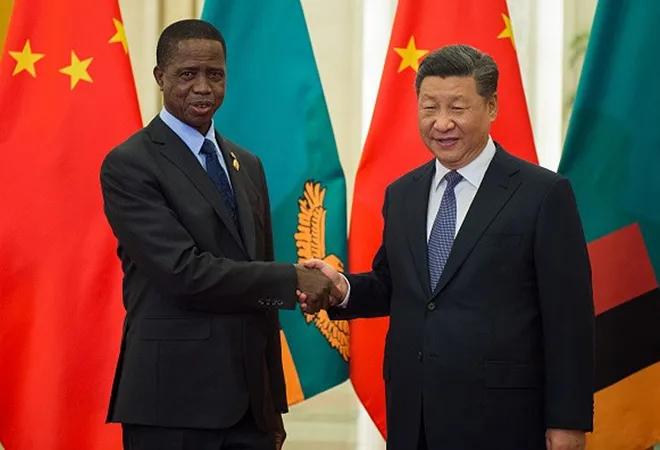
The
report in China Daily on May 24 titled ‘Three Chinese nationals murdered in Zambia’ has again drawn attention to the simmering anger against China’s growing presence in several important countries in Africa. While the murders that took place at a warehouse in Zambia’s capital Lusaka are under investigation, they are hardly the first incidence of violence between the locals and the country’s burgeoning Chinese community.
This wasn’t always the case. An older generation of Zambians fondly remembered China’s singular contribution to the country by building the Tanzania-Zambia railway line (TAZARA) during the 1970s. The 1,865 km long track connecting Dar es Salaam with Kapiri Moshi in central Zambia was more than just a remarkable feat of engineering. It provided landlocked Zambia with a vital outlet to the Indian Ocean for its copper exports, thereby breaking the stranglehold of white-ruled Rhodesia (now Zimbabwe) and apartheid-era South Africa.
But that was a different China in a different era. Things started changing in the 1990s as Zambia started to privatize its rich copper mines. State-owned Chinese firms picked up several properties at bargain basement prices, starting with the Chambishi Copper Mine in 1998. Other investments followed, accompanied by allegations of abusive labour practices and lack of safety in the mines. An explosion in April 2005 in Chambishi killed 51 miners and sparked widespread protests. In an incident in 2010 that was reminiscent of a bygone colonial era, two Chinese supervisors at the Collum coal mine opened fire at workers protesting against poor wages, lack of face masks and safety shoes and pollution of a stream that provided drinking water to the local community. Eleven miners were shot, once again provoking outrage over the impunity with which Chinese companies could act.
Meanwhile, China’s interest in Zambia had grown beyond mining. Like several other states in Africa, it was seen as a promising market for Chinese manufacturers and contractors. Over the last two decades, Chinese state-owned firms have won lucrative contracts to build airports, highways, hydro-electric stations, sports stadiums and other infrastructure projects that are often showcased as examples of China’s contribution to the development of Africa. They have usually been financed with Chinese debt and critics like former minister Chishimba Kambwili have accused the lack of transparency in these transactions. China accounts for $6.4 billion of Zambia’s total debt of $8.7 billion and reports indicate that a default could lead to China taking possession of Lusaka’s Kenneth Kaunda International Airport a la Hambantota. Other critics have decried the poor quality of construction in projects like the Lusaka-Chirundu road that was swept away by heavy rains soon after its completion. They have also described the two new stadiums in Lusaka and Ndola as white elephants – expensive and useless. These prompted James Lukuku to start the Republican Progressive Party with an aggressive ‘Say No to China’ campaign. Columnist Kalima Nkonde took it a step further, writing in the Lusaka Times in 2018 titled ‘
How China is slowly colonizing Zambian economy.’
The angst over Chinese business practices has been aggravated by the steady influx of Chinese nationals into Zambia, many who came as part of the construction force for various projects stayed back, while others came to establish trading companies, build warehouses and enter the retail trade. They have also bought fertile farmland and started cultivation. But perhaps the greatest cause of resentment comes from Chinese nationals taking up occupations at the bottom of the pyramid – selling second-hand clothes, rearing chickens and roasting maize at roadside stalls. In doing so, they are competing directly with impoverished locals. The estimated 100,000 Chinese have now become a point of friction, prompting Nkonde to observe,
‘There should be no pretence about the fact that the relationship between ordinary Zambian citizens and Chinese nationals is fraught with suspicions and mistrust in recent years unlike in the past. Zambians view Chinese as coming to take over their country. Zambians working for Chinese companies complain about low wages, poor working conditions of service, general mistreatment and racism.’
Patriotic Front leader Michael Sata was quick to recognize these strands and built his campaign during the country’s 2006 presidential elections on an explicitly anti-Chinese platform, going so far as to suggest that if elected, he would repudiate ties with China and establish diplomatic relations with Taiwan. Sata finished second with a respectable 29% of the vote and used his position as leader of the opposition to fuel populist sentiment against the Chinese presence. He ran again in 2011, this time on a more moderate platform that assured Chinese investors but asserted that they must respect the country’s labour laws. This time, Sata won with a 42% vote share, and within days, the Chambishi Copper Mine gave a substantial raise to its workers. However, Sata died three years later and reports suggest that under his successor Edward Lungu, it is back to business as usual.
The gruesome murder of Chinese nationals in Lusaka remains part of an unfinished story.
The views expressed above belong to the author(s). ORF research and analyses now available on Telegram! Click here to access our curated content — blogs, longforms and interviews.



 The
The  PREV
PREV


